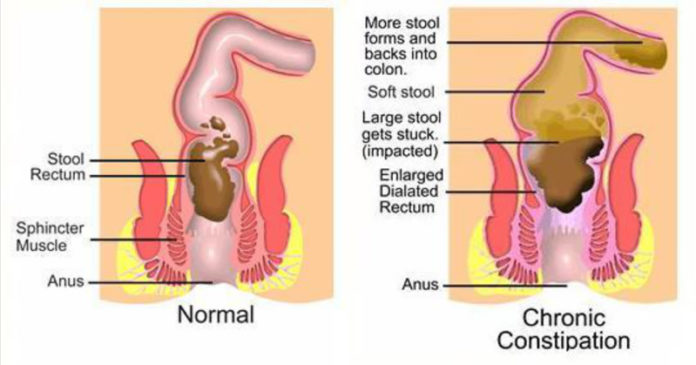What Causes Constipation?
Although you can easily overcome some causes of constipation, like lack of exercise, there are some circumstances that just can’t be avoided.
Constipation generally means that you have three or fewer bowel movements a week.
But it can also mean straining to have bowel movements or passing stools that are small, hard, and dry. The good news is that it’s easy to treat constipation, and even easier to prevent it — as long as you know its causes.
Causes of Constipation: Lifestyle and Diet
Poor diet and an inactive lifestyle are the most common causes of constipation. A lack of exercise and eating too much junk food can wreak havoc on your digestive health. Here are some diet-related factors that can leave you feeling constipated:
- Dairy products
- Foods high in fat and sugar
- Lack of high-fiber foods (like fruits, vegetables, and whole grains)
- Lack of water and other fluids
- Alcohol or caffeine
When you feel like you need to defecate, it’s important to use the bathroom immediately. Putting it off for a more convenient time (like when you get home, for example) can lead to constipation.
Find Out About Common Digestive Problems in Women
Changes to your normal routine can also cause problems with your digestive system, resulting in constipation because of sporadic access to bathrooms, lack of exercise, and changes in diet.
So when you’re traveling, try to be consistent and keep eating lots of healthy, high-fiber foods, exercising, and drinking water.
Causes of Constipation: Medications
Constipation is a common side effect of many frequently prescribed medications. If you’ve just started taking a new drug and notice that your bowel movements have changed in form or frequency, ask your doctor if your medication could be the cause.
Some common medications that can cause constipation are diuretics, antacids (with aluminum and calcium), narcotics, antidepressants, supplements, anticonvulsants, and blood pressure treatments.
Constipation can also be caused by the very medications taken to treat them — laxatives. Americans spend more than $700 million on these constipation treatments annually, but just like some other over-the-counter and prescribed medications, laxatives can become habit-forming. Taking them too often may cause your digestive system to become too dependent on them.
Causes of Constipation: Health Conditions
Constipation can also be a side effect or symptom of many health conditions. These conditions can cause stool to pass more slowly through the colon, resulting in constipation.
Try These Healthy Recipes to Aid Digestion
Irritable bowel syndrome (IBS), also known as spastic colon, is one of the most common causes of constipation. Not much is known about what causes this digestive disorder, but medical researchers believe that IBS patients have highly sensitive colons and must therefore monitor what they eat.
Other health conditions that can cause constipation include:
- Stroke
- Parkinson’s disease
- Spinal cord injury
- Hypothyroidism (underactive thyroid)
- Pregnancy
- Diabetes
- Lupus
Aging can also trigger constipation, so preventive steps to keep your bowel movements regular should be taken.
There are other conditions that can cause constipation. Talk with your doctor to get more personalized information and find out if your constipation is a side effect of another health problem. It is also a good idea to check with your doctor if there is a significant change in your bowel habits.
Constipation can be uncomfortable to talk about, but even more uncomfortable to deal with. So take a close look at your daily habits and lifestyle and see if you can pinpoint what might be causing your constipation. A healthy body means healthy digestion — feeling great inside and out.
10 Chronic Constipation Treatment Methods
Chronic constipation is a health issue that many people find deeply embarrassing, so they choose not to seek help for it.
However, moving your bowels is how your body gets rid of toxins. Also, persistent constipation can increase blood pressure.
Not only can constipation make you feel bloated and cranky, it can make you more prone to migraines and headaches—terrible given how much most of us already have to cope with in a day.
Fortunately, there are many simple ways to treat chronic constipation without spending money on medication. Here’s ten that can provide you the relief you need!
1. Drink more water and monitor your liquid intake.
Sometimes solving your constipation problem is as easy as drinking more water. Your stool will be hard if you’re dehydrated, so stick to the recommended 8-12 glasses a day—more if you’re active—and see if that will make a difference.
2. Put more fiber in your diet.
While supplemental teas or drink mix-ins are okay, it’s really better if you have a diet that has all the fiber you need to make going to the bathroom easier. Most fruits and vegetables like plums, pears and apples, as well as cereals in things like whole grain breads, are packed with nutrients as well as fiber, so it’s a good idea to cut out the junk and eat more of these to alleviate constipation.
3. Get some more exercise.
It may also have something to do with muscle tension and a need for fitness. Becoming more relaxed and helping your body settle into natural patterns is good for banishing constipation, so go jogging in the morning or even have a long, leisurely walk after a meal. It may be a bigger help than you thought. Make sure you wait for at least an hour to pass before you attempt exercising after a meal, to avoid cramping!
4. Try natural stool bulking agents.
If you can avoid using laxatives, do so. Wheat bran, and psyllium or methylcelluose, are good ways to put more fiber in your body if you’re not getting it in your diet. Mix them with plenty of water and drink up, and you’ll find it a lot easier to do what you need to do. Flaxseed and senna are also recommended natural remedies to add to your diet if you’re constipated—be careful not to overdo it, though, particularly with senna!
5. Check out your medications to see if they may be causing the problem.
Some medications, including over-the-counter ones, have constipation as a side effect and may inflame your bowels further, leading to other digestive problems. Tylenol, Oxycontin and codeine are just some of the most well-known examples. Talk to your physician and ask if you can switch to a medication that will not interfere with your bowel movements.
6. Monitor your bowel movements and avoid holding it in.
One thing that definitely aggravates constipation is messing with the body’s natural rhythm. If you need to go, go and do it—don’t hold it in and cause yourself pain through constipation in the future. Give yourself enough time on the toilet to relax and get it done properly, instead of causing yourself discomfort.
7. Have a little lemon juice with warm water.
Lemon juice is a good way to stimulate your colon in the morning and get things moving—it’s also a good way to rid the digestive walls of undigested matter thanks to the citric acid, so squeeze the juice of a fresh lemon and mix it with some warm water to start your day. There’s a reason why this drink is often called a “digestive” in some European countries!
8. When in doubt, go for prune juice.
If the other remedies just aren’t cutting it, prune juice is considered a classic cure for constipation thanks to the high amounts of fiber in the fruit. Have one glass in the morning and one at night—don’t drink them in rapid succession as this may aggravate your system and cause diarrhea. Similar, milder juices include pear and apple juice for the same reason—the fiber in the fruit juice will spell an end to your stomach woes and help you go.
9. Incorporate more yogurt into your diet.
Yogurt that has live microbacilli in it will work wonders on your digestive system and help prevent constipation, so have a cup a day—this will allow good probiotics to flourish in your gut and fight stomach inflammation.
10. Don’t just sit on the toilet—squat over it!
Squatting over the toilet may be easier for a lot of people than simply sitting on it to jumpstart your body and rid yourself of waste. It’s bizarre, but simply being in that position may actually help your body read that physical cue and end your constipation.



















































